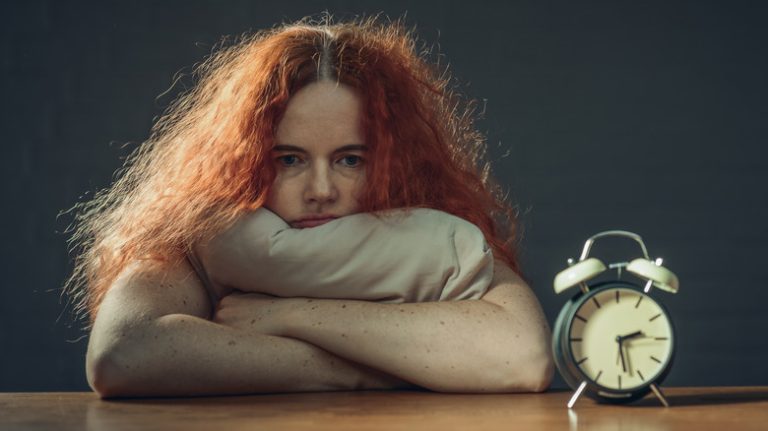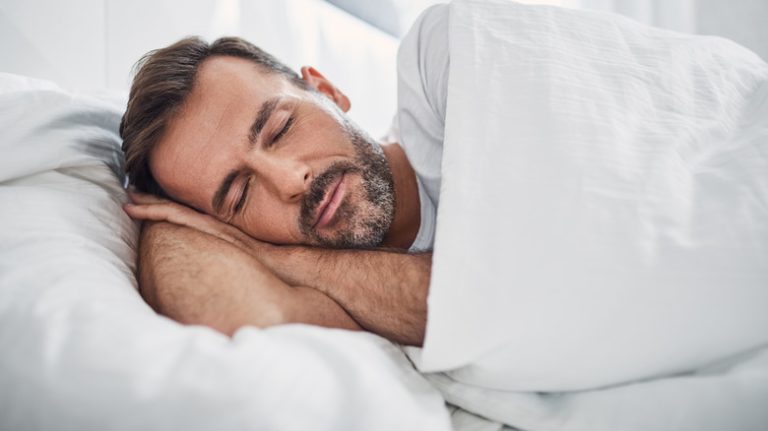Lying awake in bed and watching the hours tick by can be a painful and isolating experience. Nevertheless, it’s estimated that 56% of Americans struggle to get some shuteye each night, notes the American Academy of Sleep Medicine (AASM). The number of people turning to sleeping aides to lull them into dreamland is on the rise as well, according to a 2025 AASM survey. In fact, around 51% of Americans take “a medication, over-the-counter supplement or other substance” to fall asleep — 68% of which admit to upping their dosage and using them more frequently since the onset of the pandemic.
While sleep medication can bring short-term relief to troubled dozers, research continues to highlight the risks and hazards of taking these drugs in the long term (via National Sleep Foundation). Taking a sleeping pill on occasion might not have any major consequences, but using them routinely has been found to come along with a host of side effects, ranging from dependency to mood changes to various physical ailments. Here’s what can happen to your body when you take sleep medication every night.
You may feel drowsy the next day

Prolonged sleeplessness can cause numerous health issues, from physical problems to cognitive difficulties to even “psychotic symptoms,” according to a study in Frontiers in Psychiatry. It’s no wonder that millions of Americans are reaching for a chemical fix. But a common symptom of sleeping pills is the so-called “hangover effect,” which includes drowsiness, dizziness, clouded thinking, and poor coordination, which can have a direct impact on your ability to work, function, and perform daily tasks (via Cleveland Clinic). Approximately 3% of users even find themselves dozing off while driving due to taking sleeping aids at night, notes Consumer Reports.
This next-day grogginess is explained by the fact that most prescription sleep medications, including the sedatives known as benzodiazepines — diazepam (Valium) and lorazepam (Ativan) — and nonbenzodiazepines — zolpidem (Ambien) and eszopiclone (Lunesta) — act on the brain’s GABA receptors, causing your brain and central nervous system to slow down, according to Everyday Health. These drugs stay in your system for hours, reports the National Sleep Foundation, causing the effects to carry over into the following day.
“Many OTC sleep aids — such as Benadryl and Tylenol PM — contain diphenhydramine,” Dr. Donovan Maust, assistant professor of psychiatry at Michigan Medicine, told Time. This means that they block a chemical in your brain called acetylcholine — the main neurotransmitter of the parasympathetic nervous system — which is important for controlling muscle movements and brain functions like alertness.
It puts you in a half-sleep state
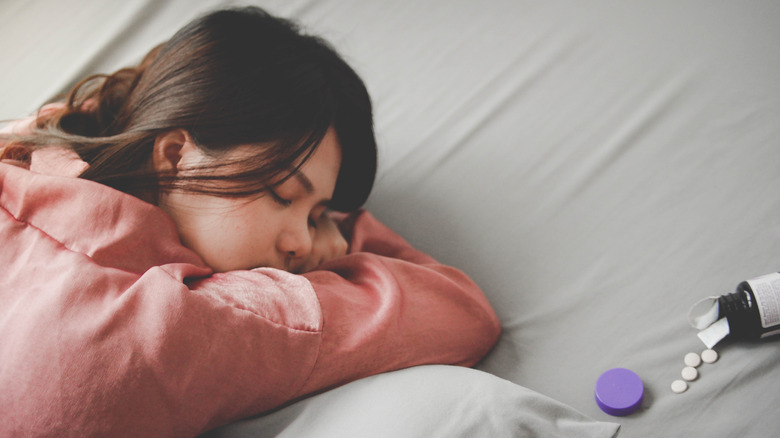
Sleeping pills don’t quite deliver what they promise, according to some researchers. People who rely on them may think that they’re getting a good night’s sleep, but they’re actually not, said Matthew Walker, a professor of neuroscience and psychology at the University of California. This is because the depth and quality of drug-induced sleep are not the same as in natural sleep, Walker detailed to The Cut. Sleep medications essentially work by “targeting a set of receptors, or ‘welcome sites,’ in the brain that are lured to basically stop your brain cells from firing,” he said. In other words: “They just switch off the top of your cortex, the top of your brain, and put you into a state of unconsciousness.”
Walker went on to describe natural, restorative sleep as an “incredibly complex ballet of neurochemical brilliance that results in numerous areas of the brain both switching on and switching off,” and conceded that there isn’t “any good pharmacological approach right now to replicate such a nuanced and complex set of biological changes.” This might account for the drunk and spacey feeling that many people get the day after taking sleep medication, and why some people still feel unrested in the morning despite sleeping for what seems like a sufficient amount of hours.
It affects your memory
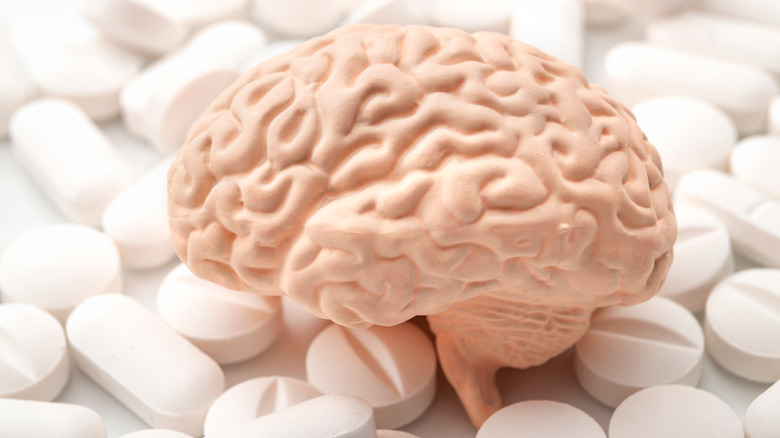
Victor Moussa/Shutterstock
Sleep deprivation can have a brutal effect on your memory (via WebMD). But it turns out that the excessive use of sleep medication could be equally damaging. According to a paper published in the Journal of the American Academy of Psychiatry and the Law, people who used zolpidem, a popular sleep aid that goes by the trade name Ambien, generally reported impaired memory and nocturnal behavior, which they had no recollection of later. While zolpidem was initially said to have minuscule adverse effects, researchers have found that when people are under the influence of the drug they can experience “parasomnia” — a disorder that includes performing active tasks like sleeping, eating, or walking while asleep.
Other studies suggest that sleep medication can cause forgetfulness by interfering with the memory consolidation phase of sleep (via Journal of Clinical Sleep Medicine). Hypnotic benzodiazepines, for example, suppress slow-wave sleep and REM sleep, which can impair the restorative quality of sleep and undermine functions involved in learning and memory (via ISRN Pharmacology).
It might worsen your mood

africa_pink/Shutterstock
There’s no shortage of sleeping aids available on the market today (via The Business Journals). Yet, evidence suggests that on the whole people are snoozing less and less (via NPR). A lack of adequate slumber can hack away at your mood over time, but the nightly habit of popping a pill can be just as detrimental, especially if you’re already struggling with emotional or psychological problems.
A 2024 study from the journal Mayo Clinic Proceedings revealed zolpidem may heighten the risk of suicide. Early research from the journal F1000Research identified an association between short-acting benzodiazepine agonists (like zolpidem and triazolam) and panic attacks, which is another risk factor for suicide. “Zolpidem specifically has been implicated as a causal agent in a number of suicides, some of which involved kinds of dissociative behavior often attributed to zolpidem or to combined use of zolpidem with other drugs or alcohol,” stated the authors of the latter study. A 2024 study from The American Journal of Psychiatry points out that while hypnotics can sometimes be dangerous for depressed folks, they may also be beneficial when prescribed in tandem with antidepressant drugs by improving individuals’ quality of sleep and providing some relief from insomnia.
It can cause hallucinations

Tunatura/Shutterstock
Chronic insomnia is known to occasionally induce perceptual distortions and even hallucinations (via Frontiers in Psychiatry). But for some, the habitual use of sleeping pills can also produce psychotic episodes. A 2024 study outlines a case of zolpidem-induced hallucinations in a patient in his seventies, while earlier research has implicated the sedative in several cases of “psychotic reactions characterized by auditory and visual hallucinations as well as delusional thinking” (via Annals of Clinical Psychiatry).
Zolpidem has come to be associated with some pretty kooky side effects in recent years, sometimes referred to as the “Ambien walrus” (via New York Magazine). It’s not clear precisely what causes these experiences when people are jacked up on the sleep medication, but it’s suggested that they may be attributed to the drug’s hypnotic effect on the brain, as it binds to and assists the neurotransmitter GABA in order to evoke sleep (via Indian Journal of Psychological Medicine).
Luckily, there are non-pharmacological alternatives for people in dire need of a night’s sleep (via TIME). Cognitive Behavioral Therapy (CBT) for insomnia, in particular, is said to be a first-line of treatment that can help you establish a consistent bedtime routine and develop habits and strategies that are conducive to falling asleep. Many behavioral interventions are actually more effective than sleeping tablets, based on a metanalysis from the American Journal of Psychiatry.
Your sleep problems might get worse
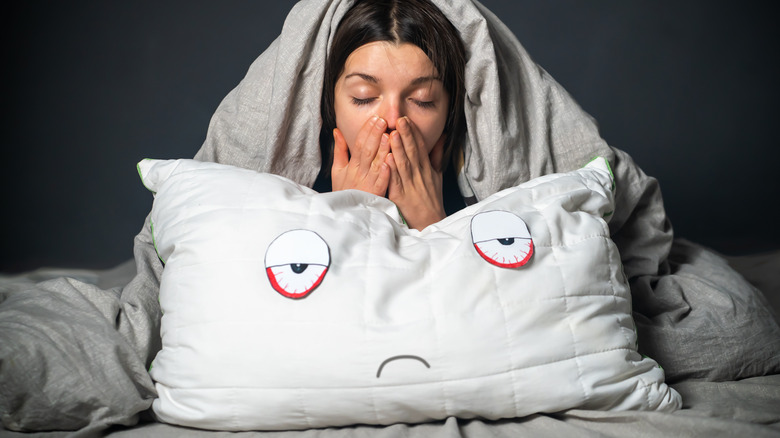
africa_pink/Shutterstock
Sleep medication can feel like a magic bullet when it works, especially if you’ve suffered through bouts of lack of sleep. But it’s important to remember that there is no pharmacological cure for insomnia (via The Cut). Sleeping pills are only meant to serve as a temporary solution. And researchers have found that some people experience “rebound insomnia” when they use these drugs habitually, which is when their sleep problems actually worsen upon discontinuation (via Sleep Disorders in Selected Psychiatric Settings).
Many sleeping pills work by boosting chemicals that are naturally occurring in the brain, such as the neurotransmitter GABA or the hormone melatonin (via Journal of Central Nervous System Disease). When you suddenly stop using them, your brain — which has grown accustomed to these sleep aids — has to reorient itself and function in their absence. So, you may find yourself facing some pretty harsh withdrawal symptoms, for instance, it can feel even harder to fall asleep, which makes sleep medication seem like the only respite.
However, a 2024 study from the Journal of Insomnia and Sleep Disorders revealed that a majority of chronic insomnia patients (who are occasional users) don’t go on to develop a tolerance to hypnotic sleep medication, and are able to stop using them when they choose to without their sleep woes escalating.
You can develop a dependency

fizkes/Shutterstock
Sleeping pills are recommended only for short-term use and shouldn’t be taken for more than seven to 10 days (via Everyday Health). Occasionally, people are able to use them for a longer period of time. But one of the main dangers of taking sleeping medication on a nightly basis is that you can build up a tolerance, warns the Sleep Foundation. As a result, you might find yourself increasing your dosage in order to get the same effects and you can become emotionally or physically dependent on them in the long term. They may even stop working altogether.
More than 68% of people get into the habit of using prescription sleeping pills for longer than they’re advised, based on a 2024 study published in the Journal of the American Medical Association. And some people go on to abuse these drugs by taking more than the usual recommended dose to help them drift off. A telltale sign that you may be forming an unhealthy habit or getting tangled up in an addiction to your sleep medication is that you start to experience withdrawal when you cut back drastically or stop taking them, which can range from physical to cognitive to emotional symptoms, per the Sleep Foundation. A 2024 study from the Journal of Clinical Sleep Medicine highlighted that prescription pills like benzodiazepines can yield “dependency and serious withdrawal complications” if they’re stopped abruptly after being used in high doses.
It increases your risk of falling down
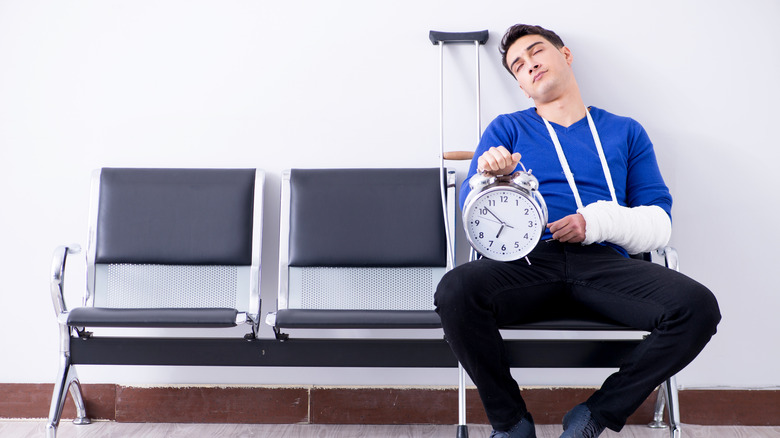
Elnur/Shutterstock
Unsurprisingly, sleep medication has been linked to a spike in injurious falls and hip fractures. After all, these drugs make people dozy, and their effects can lead to various accidents when people wake up in the middle of the night or in the morning. In a sleep laboratory study published in the Journal of the American Geriatrics Society, researchers uncovered that zolpidem impaired body balance and steadiness in both younger adults (mean age, 22) and older adults (mean age, 67) upon waking up from two hours of sleep.
“The effects on walking stability were very pronounced in older adults, and the effects on cognition were actually even more pronounced in the younger than in the older adults,” one of the study authors, Kenneth P. Wright, told Medscape Medical News, adding that the use of nonbenzodiazepine hypnotic medications “may have greater consequences for health and safety than previously recognized,” with the occurrence of falls at nighttime being a prominent concern.
The study sheds light on the potential perils of hypnotic drugs when sleep is interrupted. However, “studies to date have shown conflicting data, some suggesting sleeping pill use increases risk, while others have not found such a risk,” Lawrence Epstein, a member and past president of the American Academy of Sleep Medicine, also told the publication.
It may contribute to developing dementia

fizkes/Shutterstock
There’s evidence that memory and psychomotor function deteriorate considerably just a few hours after taking a prescription sedative, like zolpidem (via Journal of Clinical Psychopharmacology). And the impact of this appears to be greater for women than men since the female body takes longer to metabolize one of its active chemicals. But it’s believed that sleeping pills can have longer-term consequences too, potentially paving the way to a neurological condition like dementia for some people. A recent study from the journal Sleep Medicine highlights the possible relationship between the use of sleep medication and an increased risk of dementia including Alzheimer’s disease among older adults in the US. The researchers found that the routine use of sleeping pills (namely “most nights” or “every night”) was associated with a dementia diagnosis later on in life. The authors emphasize that the “US healthcare system is in need of creative solutions for addressing poor sleep among older individuals.”
The main classes of drugs that have been pinpointed as having this effect on the brain are benzodiazepines and anticholinergics (via Harvard Health Publishing). Anticholinergic medications are known to block acetylcholine (ACTH) — a chemical in the brain that’s crucial for memory and learning. And there’s growing evidence that these drugs elevate the risk for dementia or dementia-like symptoms like disorientation, lack of focus, and memory loss — even when taken 15 or 20 years earlier, suggest researchers (via The American Journal of Geriatric Psychiatry).
It can cause heart problems

Iana Alter/Shutterstock
Sleep disorders are a common accompanying condition in patients with heart failure — which is said to affect around 5.1 million people in the US (via Medical News Today). But there’s evidence that taking a sleeping pill before bed could dramatically increase your risk of cardiovascular issues. A Japanese study led by Masahiko Setoguchi, a doctor at the Social Insurance Central General Hospital in Tokyo, showed that people who used sleep medication were at a much greater risk of serious heart problems than those who didn’t take any sleeping aids (via ScienceDirect).
Specifically, the study looked at the medical records of 111 heart failure patients from 2024 to 2013. Patients who took benzodiazepine hypnotics were eight times more likely to experience heart failure or death from heart-related complications than patients who didn’t rely on these pills. This led to the conclusion that benzodiazepines can have a negative impact on both breathing and heart function and should be consumed mindfully.
“Benzodiazepine hypotonics may have cardiodepressant actions,” Setoguchi told ScienceDirect. “They may also exert respiratory depressant actions which could exacerbate sleep-disordered breathing and lead to a worse prognosis.” Nevertheless, the researchers admit that further research is needed to verify cause and effect when it comes to the relationship between sleeping pills and cardiovascular health.
It may hurt your immune system

brizmaker/Shutterstock
While natural sleep is known to strengthen and restore our immune system, knocking back sleeping pills can actually have the opposite effect, according to research. A 2024 review of more than 200 studies investigating the dangers of sleep medications discovered that people who used sedatives to sleep were more likely to catch infections and illnesses (via F1000Research). In fact, clinical trials found that infection rates are 44% higher among people who use hypnotic drugs compared to placebos. And the lead manufacturer of prescription sedative-hypnotic zolpidem has acknowledged that zolpidem can give rise to infections, based on its own research findings.
Earlier research from the journal Thorax also found that benzodiazepine sleeping pills can drive up your risk of catching pneumonia by as much as 50%. This might be explained by the fact that when you take these medications every night, you’re often failing to enter a deep sleep or REM sleep (via ISRN Pharmacology), which is needed for immune cell rejuvenation and the growth of new immune cells, as noted by the Sleep Foundation. In other words, sleep medications compromise immune health by blunting the quality of your sleep overall, leading to an increased risk of infections and illnesses.
It may affect your digestion
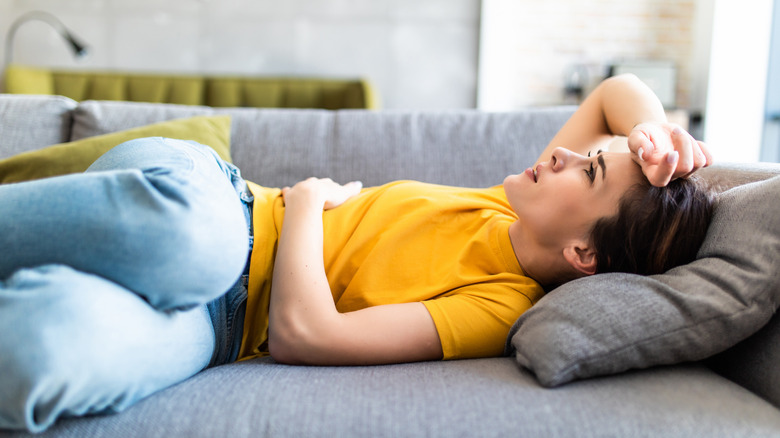
F8 studio/Shutterstock
Many users of sleeping pills complain that these medications wreak havoc on their stomach (via The People’s Pharmacy). Some common gastrointestinal and digestive issues include diarrhea, nausea, constipation, and stomach pain or tenderness (via Cleveland Clinic). A 2024 study from the journal PLoS One indicates that people who regularly consume hypnotic sleep medication like zolpidem are more likely to catch an intestinal infection known as “Clostridium difficile-infection”, which is caused by a toxin-producing bacteria that can lead to inflammation of the colon and chronic diarrhea.
Zolpidem can also amp up stomach acid, causing damage to the cell lining of the esophagus and aggravating your digestive system, as reported by a study published in the journal Clinical Gastroenterology and Hepatology. The researchers at Thomas Jefferson University Hospital discovered that people sedated by zolpidem experienced more nighttime acid reflux than usual but slept through the night without swallowing — which is a protective arousal reflex and the body’s way of defending itself against potential damage from acid regurgitation. If left untreated, prolonged acid exposure can break down the esophageal lining over time, and even increase your risk of esophageal cancer.
It’s said to increase your risk of cancer

Andrii Zastrozhnov/Shutterstock
Anyone who’s endured the brunt of insomnia knows how frustrating it can be. Still, you may want to think twice before you get into the swing of popping a sleeping pill every night, warn researchers. Though rare, one of the more severe consequences of depending on sleep medication to doze off each night is the risk of cancer. A study published in BMJ Open observed that people who took as little as one to 18 sleeping pills — specifically, the prescription sedatives zolpidem — were more likely to die prematurely than those who didn’t take any sleeping aids. But patients who were given larger doses (more than 132 pills in a year) were more than three times likely to develop a new major cancer — including cancers of the lungs, colon, and prostate — and five times more likely to die. This may be due to the carcinogenic effects of hypnotics, which can cause chromosomal damage, explain the researchers, drawing on previous research.
Multiple studies have reiterated these findings, drawing attention to the possible relationship between various types of sleeping pills including benzodiazepines and nonbenzodiazepines, and the increased risk of dying from cancer (via F1000Research). It may be argued, however, that further research can help determine whether sleep medications are the true cause of increased cancers and deaths, or if, maybe, people who have a higher risk of developing cancer and dying are more likely to abuse sleeping pills.
It can shorten your lifespan

Anastasiya 99/Shutterstock
Sleep drugs cause you to feel drowsy — this is evidently part of what makes them so effective. But taking these pills every night for an extended period of time could lead to an increased tolerance, which means that they work less and less, and you need more and more to get the same effects (via Sleep Foundation). This can result in various life-threatening symptoms, such as shallow breathing, and, in some cases, a coma or death (via DrugAbuse.com).
People who routinely used hypnotic sleep medication had greater incidents of death, especially from an overdose and suicide, but also from respiratory failure, fatal drug interactions, and even homicide, according to an aforementioned 2024 review study (via F1000Research). Likewise, the study from the BMJ Open highlights that people who use sleeping pills at least every two or three days a week face a three-fold greater risk of dying than non-users. Premature death associated with hypnotic drugs is often found to be caused by accidents and injuries, gastroesophageal regurgitation, and peptic ulcers — which precipitate the risk of infections — and more severely, cancer.
The good news is that if you’re struggling to fall or stay asleep, sleeping pills — or being caught in a doom loop — are not your only options; There are various highly effective CBT-based strategies for tackling and coping with insomnia, reports an article by The New York Times.


